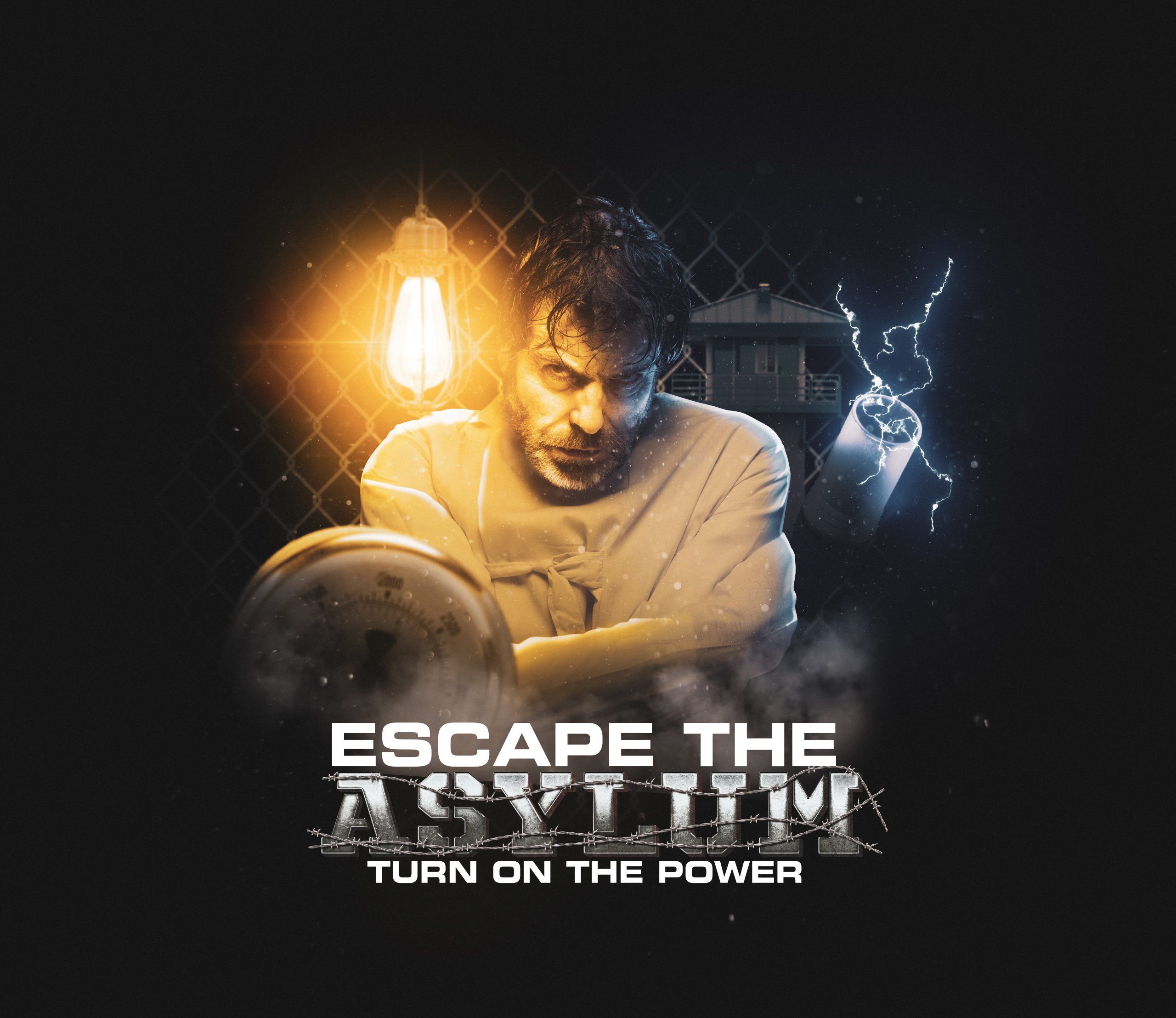No Results Found
The page you requested could not be found. Try refining your search, or use the navigation above to locate the post.



ESCAPE ROOMS - WHAT ARE THEY & WHY
Cracking the Code: Unleashing Your Problem-Solving Skills in Escape Rooms Welcome to the thrilling world of escape rooms, where brains are put to the ultimate test! In this article, we will embark on a journey to crack the code and unleash your problem-solving skills in escape rooms. Escape rooms have taken the world by storm, captivating puzzle enthusiasts and adrenaline junkies alike. These immersive experiences are designed to challenge your wits, creativity, and teamwork as you find yourself locked in a room, needing to decipher clues, solve riddles, and unravel mysteries in order to escape before time runs out. Whether you’re a novice looking for an exciting adventure or a seasoned player eager for a new challenge, this guide will equip you with the strategies and insights needed to conquer even the most perplexing escape rooms. Join us as we explore the essential skills required to succeed in escape rooms, from effective communication and critical thinking to resourcefulness and attention to detail. We’ll also share tips on how to work seamlessly as a team and make the most of your limited time. Get ready to immerse yourself in the world of puzzle-solving, adrenaline-pumping excitement, and unforgettable adventures. Are you up for the challenge? Let’s crack the code and escape the room together! The Importance of Problem-Solving Skills in Escape Rooms Escape rooms are not only about escaping a locked room; they are about solving puzzles and cracking codes. To succeed in these immersive experiences, problem-solving skills are crucial. In the fast-paced and high-pressure environment of an escape room, the ability to think critically and come up with creative solutions is essential. When faced with a challenging puzzle, problem-solving skills will help you analyze the situation, break it down into manageable parts, and identify the best course of action. These skills also enable you to approach problems from different angles, think outside the box, and discover hidden solutions that may not be immediately apparent. In an escape room, every second counts, and having strong problem-solving skills can be the difference between success and failure. Developing problem-solving skills not only enhances your escape room experience but also has real-world applications. The ability to solve problems efficiently and effectively is highly valued in various aspects of life, including work, relationships, and personal development. So, by honing your problem-solving skills in escape rooms, you’re also investing in your overall growth and success. Understanding the Basics of Escape Room Puzzles Escape room puzzles come in a variety of forms, each with its own unique set of challenges. To excel in escape rooms, it’s important to understand the basics of these puzzles and how they are designed to test your problem-solving abilities. One common type of puzzle found in escape rooms is the hidden object puzzle. In this type of puzzle, players must search the room for clues, keys, or other hidden objects that will help them progress. Attention to detail and careful observation are key in solving these puzzles. Remember to thoroughly examine every nook and cranny, as even the smallest detail could be a crucial clue. Another type of puzzle often encountered in escape rooms is the logic puzzle. These puzzles require players to use deductive reasoning and logical thinking to solve them. Examples of logic puzzles include Sudoku, riddles, or pattern recognition tasks. The key to solving logic puzzles is to break them down into smaller, solvable parts and to approach them systematically. By analyzing the information given and eliminating possibilities, you can gradually uncover the correct solution. Developing a Problem-Solving Mindset To become an effective problem solver in escape rooms, it’s important to cultivate a problem-solving mindset. This mindset involves adopting a flexible and open approach to challenges, embracing curiosity, and maintaining a positive attitude even in the face of difficulties. One way to develop a problem-solving mindset is to practice mindfulness. By being present and fully engaged in the escape room experience, you can better observe and absorb information, allowing you to make connections and come up with innovative solutions. Additionally, mindfulness helps reduce stress and improves focus, which are crucial components of effective problem solving. Another important aspect of a problem-solving mindset is embracing failure. In escape rooms, it’s likely that you’ll encounter puzzles that you can’t solve right away. Instead of getting discouraged, view these moments as valuable learning opportunities. Analyze what went wrong, identify any patterns or strategies that didn’t work, and adjust your approach accordingly. Remember, failure is an essential part of the problem-solving process, and each unsuccessful attempt brings you closer to success. Strategies for Solving Escape Room Puzzles Now that you understand the importance of problem-solving skills and have developed a problem-solving mindset, let’s explore some strategies that can help you conquer escape room puzzles. One effective strategy is to divide and conquer. In escape rooms, there are often multiple puzzles to solve simultaneously. Instead of tackling them all at once, assign different puzzles to team members based on their strengths and interests. By dividing the workload, you can maximize efficiency and make progress on multiple fronts. Additionally, working together allows for collaboration and brainstorming, which can lead to breakthroughs and new perspectives. Another strategy is to communicate effectively. Good communication is essential in escape rooms, as it enables team members to share information, coordinate efforts, and avoid duplication of work. Establish clear lines of communication from the start, and encourage everyone to voice their ideas and observations. Remember, a fresh pair of eyes or a different perspective might be the missing piece of the puzzle. Teamwork and Communication in Escape Rooms Escape rooms are designed to be tackled as a team, and successful teamwork is often the key to escaping within the allotted time. In addition to effective communication, there are other elements that contribute to a cohesive and efficient team. First and foremost, trust is crucial. Trusting your teammates allows for open and honest communication and fosters a sense of collaboration and support. Encourage a respectful and inclusive environment where everyone’s ideas are valued and considered. Another important aspect of teamwork in escape rooms is delegation. Assigning roles and responsibilities based on individual strengths and expertise can streamline the problem-solving process. For example, someone with excellent observation skills can focus on finding hidden objects, while another team member with strong logical thinking can tackle complex puzzles. By playing to each other’s strengths, you can optimize the team’s performance. Lastly, time management is key. Escape rooms often have a time limit, and effective time management ensures that no valuable seconds are wasted. Set clear goals and prioritize tasks based on their level of difficulty or importance. Regularly check in with the team to assess progress and make adjustments if necessary. Remember, time is your most valuable resource, so make every second count. Tips for Effective Problem Solving in Escape Rooms While every escape room is unique, there are some general tips that can help you become a more effective problem solver. First, start by surveying the room and taking note of any obvious clues or objects. Look for patterns, numbers, symbols, or anything that stands out. Sometimes, the key to solving a puzzle is right in front of you. Next, communicate with your teammates and share your findings and observations. Collaboration can lead to fresh perspectives and new ideas. Avoid working in isolation and leverage the power of teamwork. If you find yourself stuck on a particular puzzle, don’t be afraid to ask for hints or clues from the game master. They are there to assist you and ensure you have an enjoyable experience. However, try to exhaust all possible solutions or approaches before seeking help to truly challenge yourself. Additionally, stay organized by keeping track of the clues and puzzles you’ve encountered. This can help you identify patterns or connections between different elements in the room. Use a pen and paper, take photos, or utilize any tools provided by the escape room to document your progress. Finally, trust your instincts and don’t overthink. Sometimes, the solution is simpler than it seems. Trust your intuition and go with your gut feeling, even if it seems unconventional. Remember, escape rooms are designed to challenge your problem-solving skills, so expect the unexpected. Common Mistakes to Avoid in Escape Rooms While navigating escape rooms, it’s essential to be aware of common mistakes that can hinder your progress. By avoiding these pitfalls, you can optimize your problem-solving abilities and increase your chances of success. One common mistake is overlooking important details. Escape rooms are often filled with intricate props and decorations, and it’s easy to get distracted by the aesthetics. However, important clues and information can be hidden in plain sight, so pay attention to every detail, no matter how insignificant it may seem. Another mistake is fixating on one solution. It’s easy to get tunnel vision and become fixated on a single approach or solution. However, escape rooms are designed to be multifaceted, and there are often multiple ways to solve a puzzle. Be open to alternative solutions and approaches, and don’t be afraid to try something different if your initial strategy isn’t working. Lastly, time mismanagement can be a major pitfall. With the pressure of a ticking clock, it’s easy to lose track of time and get caught up in a single puzzle. Remember to regularly assess your progress, allocate time to different puzzles based on their difficulty, and make adjustments if necessary. Being mindful of time can prevent you from running out of time before you can escape. How to Improve Your Problem-Solving Skills Outside of Escape Rooms While escape rooms provide an excellent platform for honing problem-solving skills, there are also ways to improve these skills outside of the escape room setting. One effective method is to engage in puzzles and brain-teasers regularly. This can include solving crossword puzzles, playing Sudoku, or participating in online puzzle challenges. These activities help sharpen your analytical and logical thinking skills and keep your problem-solving abilities in top shape. Another way to enhance problem-solving skills is to engage in creative activities. Painting, writing, or playing a musical instrument can stimulate your creativity and encourage you to think outside the box. These activities also promote divergent thinking, which is the ability to generate multiple solutions to a problem. Additionally, reading books and engaging in intellectual discussions can broaden your knowledge base and expose you to different perspectives and problem-solving approaches. By exploring various topics and ideas, you can expand your problem-solving toolkit and develop a more holistic approach to challenges. Conclusion Escape rooms offer a thrilling and immersive experience that challenges your problem-solving skills like no other. By understanding the importance of problem-solving skills, familiarizing yourself with different types of escape room puzzles, and adopting a problem-solving mindset, you can conquer even the most perplexing challenges. Remember to communicate effectively, work as a team, and manage your time wisely. Be open to alternative solutions, trust your instincts, and learn from both successes and failures. With practice and perseverance, you’ll develop the problem-solving skills needed to crack the code and escape the room. So, are you ready to embark on this exhilarating adventure? Gather your friends, sharpen your problem-solving skills, and get ready to immerse yourself in the world of escape rooms. It’s time to crack the code and unleash your inner problem solver!

